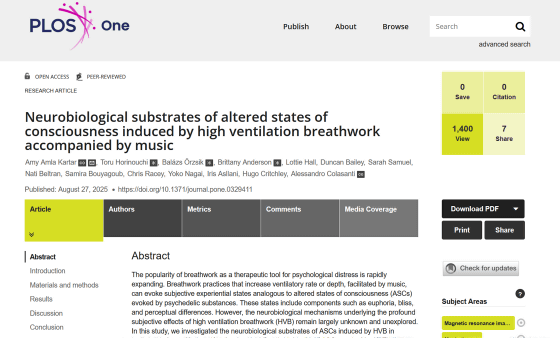Combining fast breathing with music can mimic hallucinogen-induced altered states of consciousness (ASC).

Neurobiological substrates of altered states of consciousness induced by high ventilation breathwork accompanied by music | PLOS One
https://journals.plos.org/plosone/article?id=10.1371/journal.pone.0329411

Breathwork can induce altered states of consciousness linked with changes in brain blood flow | EurekAlert!
https://www.eurekalert.org/news-releases/1095485
High ventilation breathwork (HVB), a breathing technique that involves rapid and deep breathing, is believed to induce altered states of consciousness, an extraordinary change in subjective experience, when practiced while listening to stimulating music. However, the neurobiological mechanisms underlying the altered states of consciousness induced by HVB and the subjective experience remain largely unknown.
So, Amy Carter, a research assistant in the Department of Clinical Neuroscience at Brighton and Sussex Medical School , and her team conducted an experiment with experienced high-ventilation breathwork practitioners.
The experiment was divided into three sessions: an online session where participants observed the practice of high-ventilation breathwork via camera, a session where participants practiced high-ventilation breathwork while undergoing MRI scans, and a lab session where participants practiced high-ventilation breathwork while undergoing heart rate and respiration monitoring. 15 participants participated in the online session, 19 in the MRI session, and 8 in the lab session.
In all sessions, participants performed 20-30 minutes of hyperventilatory breathwork while listening to music. Within 30 minutes of completing the breathwork session, participants completed a series of questionnaires reflecting on their experience during the session, and brain images were taken during the session in an MRI session.

Results showed that the intensity of the altered states of consciousness induced by hyperventilation breathwork was proportional to activation of the cardiovascular sympathetic nervous system, suggesting a potential stress response. The altered states of consciousness were also associated with a significant reduction in blood flow to
High-ventilation breathwork caused a significant decrease in blood flow throughout the brain, but during the session blood flow to the right amygdala and anterior hippocampus, which are involved in processing emotional memories, gradually increased. These blood flow changes have been shown to correlate with the psychedelic experience and may underlie the effects of high-ventilation breathwork.
In all sessions, subjects reported a reduction in fear and negative emotions, and no adverse events such as panic attacks were reported. Additionally, regardless of the experimental environment, subjects experienced an enhanced altered state of consciousness characterized by oceanic boundlessness through high-ventilation breathwork.
Oceanic feelings is a psychological term that describes a range of emotions, including spiritual experiences, heightened insight, states of bliss, positive depersonalization, and feelings of belonging. Oceanic feelings are thought to be a characteristic aspect of altered states of consciousness induced by hallucinogens such as psilocybin , the compound found in magic mushrooms.

In their paper, the research team states, 'This study is the first to use neuroimaging to map the neurophysiological changes that occur during breathing exercises. Our key findings are that breathing exercises can reliably induce deep psychedelic states. These states appear to be associated with functional changes in specific brain regions involved in self-awareness, fear, and emotional memory processing. We also confirmed that deeper changes in blood flow in specific brain regions are associated with deep sensations of unity, bliss, and emotional release, collectively referred to as 'oceanic feelings.''
'Doing this research has been a great experience, and it's been exciting to explore such new territory,' said Carter. 'While many people have experientially recognized the health benefits of breathing techniques, this fast-paced breathing technique has received very little scientific attention. I'm extremely grateful to all the participants who made this research possible.'
in Science, Posted by log1h_ik